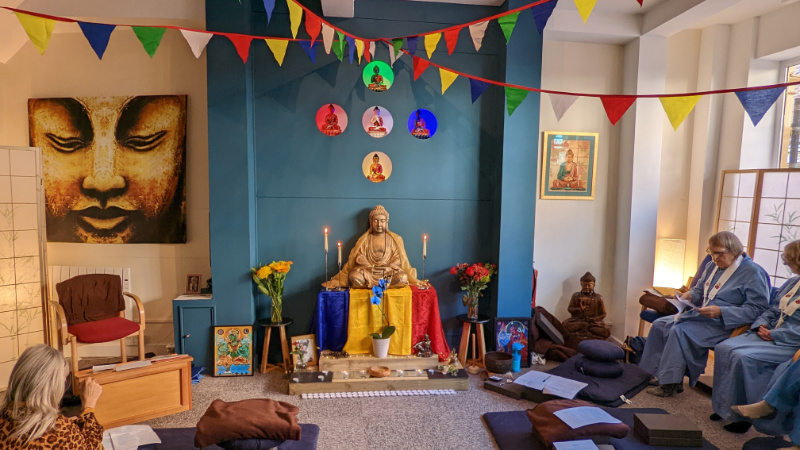Setting up a Charity (England/Wales)
as a trusted legal organisation. Let’s get started…!
Considerations before you start
What are the benefits of being a charity?
There are six key advantages to having charitable status:-
1. Recognition as `bona fide’ and trustworthy.
2. Rate relief on any premises you occupy: you are entitled to 80% relief, with the possibility of a further 20% at the discretion of your rating authority. This can be further extended to 100% relief if your Centre is registered as a ‘Place of Religious Worship’. Guidance for the procedure for doing this can be found on the Triratna Centre Support website.
3. Relief from direct taxes such as corporation tax, income tax, inheritance tax, and capital gains tax.
4. Tax benefits on gifts made to the charity through covenants, gift aid and legacies.
5. Some possible advantage in the payment of VAT. For details contact customs and excise.
6. You may raise funds from trusts and donors that only give to registered charities.
Are there downsides?
Obviously there are requirements that need fulfilling to be a registered charity – these are outlined in more details in the Trustee’s Handbook but include:
- keeping good records of meetings and decisions
- producing an annual report about its activities which demonstate it is fulfilling its aims and is of benefit to the public
- maintaining good financial records which need independent examination once the turnover is more than £25,000 (they need an audit once over £1 million)
Charities must only undertake charitable activities. The following two areas are not usually regarded as charitable:
1. Political activity – charities cannot exist primarily for political purposes, although they can campaign and lobby when to do so is: relevant to the Charity’s objects; in the interest of the charity’s beneficiaries; not party political; is not the main work of the charity.
2. Commercial activity (trading) – charities can carry out a trading activity if it directly furthers the primary purposes of the charity, or if it involves the sale of things produced by the beneficiaries, or it involves charging for services provided to the beneficiaries (e.g. meditation tuition) or the sale of donated goods. Other commercial activity may be undertaken if it is incidental and ancillary to the charity’s main work.
You may not consider these ‘downsides’, just what is required and what are the restrictions.
You could also consider opening an ‘unregistered’ charity, for the purposes of having funds held not by an individual. You can’t employ, enter into contracts etc, but if you’re income is unlikely to reach the threshold of £5k income (at which point you have to register) it might be the easiest option. No Gift Aid though. More details here
It is worth saying too that some organisations don’t give grants to religious charities.
What sort of charity should we go for?
The Charity Commission consider 4 structures of charity but the one that is always advised in recent times is the CIO (Charitable Incorporated Organisation) which offers limited or no liability to trustees.
Within that, there is a choice of either a Foundation or Association model. Most Centres would choose the Association model where trustees are re-elected at the AGM, and local (or other) Order Members are ‘members’ of the charity and vote on who the trustees are.
The Foundation model is where the Trustees select other Trustees themselves and there are no members.

Opening of York Buddhist Centre (Oct. 2022)
What you will need
To start an application, go to this site
Find your trustees
You’ll need the names and details of at least 3 trustees – there is a middle way between being small and nimble (so it’s easy to arrange meetings) and being a larger body of trustees (which will extend the skills/experience to call upon, as well as allowing more chance of a quorate meeting). Most Triratna charities have between 5 and 10.
Make sure none of them are ineligible.
All trustees should understand their responsibilities and should be familiar with this handbook.
Create your constitution
It is advised by the Charity Commission to be as near to their suggested one as possible. Here is one that has been accepted recently – it is a non-editable google doc which you can copy and then replace the xxxx etc with the relevant details:
CIO (Association) Constitution
If you make changes from their agreed/approved constitution you need to explain why.
Please be sure to read the ‘important update 2025’ below.
Important update 2025
Manchester Buddhist Centre engaged in a drawn out battle with the Charity Commission over the constitution for the new CIO. They are VERY keen that new charities stick to their model governing document, which in effect means that no trustees can be employed by the charity (although they offer the possibility of permission being given on a case-by-case basis, but we are yet to see how flexible/generous they are with this).
This constitutes quite a shift for Triratna charities of the future and one that needs careful consideration, as it’s always been important that the most committed and most intimately involved with a Centre (who are often employed) should be trustees. Some Centres may be awash with such good people with plenty of harmony and trust, and thus it would be unlikely to present a risk (and those employed people could be invited as guests to council meetings). But in some cases it could represent a risk and make it more difficult for the Chair to ‘lead’.
Perhaps Manchester was unlucky with the person they had dealing with their application, but it probably represents a general stance based on it being typically healthy for trustees and operational staff to be separate bodies, even if there are robust ‘conflict of interest’ policies in place.

